Putin’s wartime bluster obscures Russia’s precarious future

The grim realities of Russia’s war in Ukraine — tens of thousands dead, international isolation and a declining quality of life — are not part of the alternate reality of nationalist fervor created by the Kremlin’s propaganda machine.
But the future of Russia is bleak, experts told The Hill on the anniversary of the war, with Russian President Vladimir Putin showing no signs of letting up and the Russian people facing rising uncertainty over how it will end.
“Certainly Putin … he basically threw his country back decades,” said Anna Vassilieva, director of the Monterey Initiative in Russian Studies at the Middlebury Institute of International Studies.
“I always say we’ll have that blood on our faces for generations now, because of what he did. And that’s a terrible burden — we are lucky if there’s no nuclear war.”
Putin has so far weathered military defeats and has maintained a stranglehold on the minds of his people — even as his war is increasing the threat of nuclear weapons use to its most dangerous point since the Cold War, and his military commits atrocities of murder, rape and torture.
Comprehensive insight into Russian public opinion is difficult to gauge, as the government has criminalized opposition and acts of protests are quickly and brutally stamped out.
The Russian state has so far shown an ability to weather sanctions pressure, thanks largely to the Kremlin’s ability to prop up its economy through energy exports, helping protect against mass discontent.
Illicit and creative shipping through third-countries and domestic production are replacing imports blocked by Western sanctions, helping to backfill Russian military supplies and easing the squeeze on a population of people who are told they are victims in a war waged by the West.
“Let me reiterate that they were the ones who started this war, while we used force and are using it to stop the war,” Putin said in a major address to the Russian legislature on Tuesday.
There are presently few, if any, good options to compel Putin to withdraw his troops or bring about a secure cease-fire to halt the fighting.
Advocates for dialogue warn against focusing solely on military superiority, raising alarm that pushing Putin too tightly into a corner may trigger unpredictable and irrevocable consequences — a fear stoked by the Kremlin’s nuclear saber-rattling.
But Ukraine’s strongest supporters say that serious dialogue with Putin is folly, as he has demonstrated a disregard for holding to any commitments beyond his own ambitions.
Yet the challenges of holding Russian society together will only grow as Putin’s war rages into its second year.
Sanctions are imposing a slow deterioration
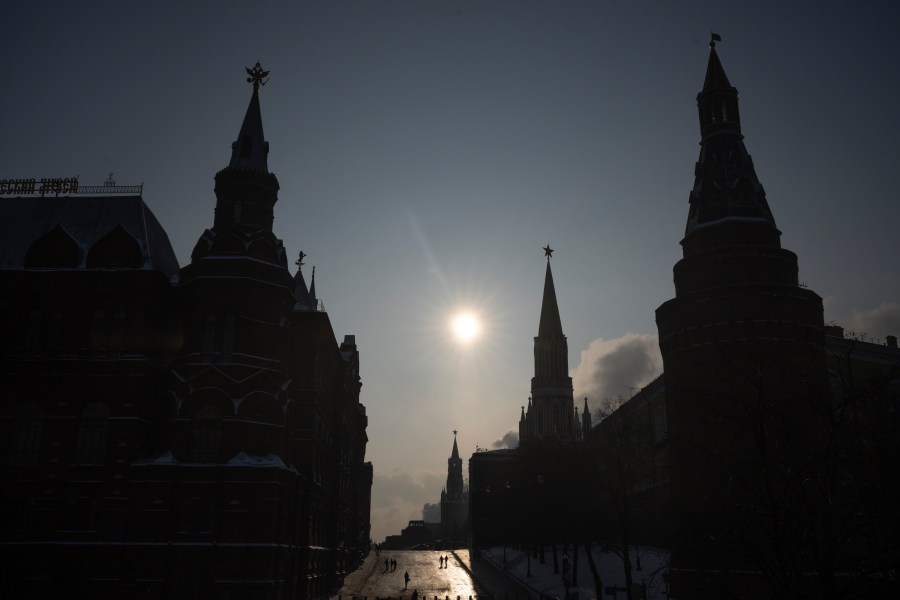
A virtually empty Red Square closed for security reasons prior to Russian President Vladimir Putin’s annual state of the nation address. U.S. officials say Russia is now the most sanctioned country in the world. (AP Photo/Alexander Zemlianichenko, File)
Sanctions imposed by Group of Seven (G-7) countries — the U.S., Canada, France, Germany, Italy, Japan and the United Kingdom — and the European Union are aimed at strangling Putin’s ability to finance his war.
Experts are still evaluating the impact.
“One of the really remarkable things about the sanctions efforts so far has been the degree of coordination with the G-7, it’s really been moving in lockstep the entire time,” said Emily Kilcrease, senior fellow and director of the energy, economics and security program at the Center for a New American Security.
“That is unusual. And to the extent that the sanctions are having success, it’s because of that,” she added.
But Putin and his government have defied expectations, with the economy reported to be contracting by far less than originally predicted, largely financed by its energy sector.
“If sanctioning instruments are not working at this point, it is because we still have this fundamental problem with Russia’s energy relationship with Europe and with the global market,” Kilcrease said.
Russian energy exports reportedly brought in $218 billion in revenue in 2022 — with the U.S., E.U. and other partners seeking to balance restrictions with limited backlash against their own societies and energy costs.
Weapons are being provided by Iran and North Korea, according to Ukraine, the U.S. and allies, while China is said to be considering delivering lethal aid to Moscow.
Russia has also subverted export bans, with a report by the policy accelerator group Silverado detailing how Russia is routing commodities through third countries, citing import data for smartphones, washing machines, refrigerators and freezers, passenger vehicles and semiconductor chips.
China and Hong Kong are cited as the primary suppliers of the chips. The integrated circuits are essential for the engineering of critical battlefield supplies but also have more benign uses in everything from cell phones to cars.
It’s tricky to cut off all these supplies, with the G-7 sanctions largely targeted at depriving Russia of chips that source technology from the U.S. and other countries in the sanctions group, like Japan and the Netherlands.
“There’s probably some of that, that is illicit,” Kilcrease said of Russian chip imports, “but there’s probably some that is legal under the existing export controls, because it’s super, low-level chips. Would there be a desire at some point to go after that sort of trade flow?”
Slow declines in quality of life
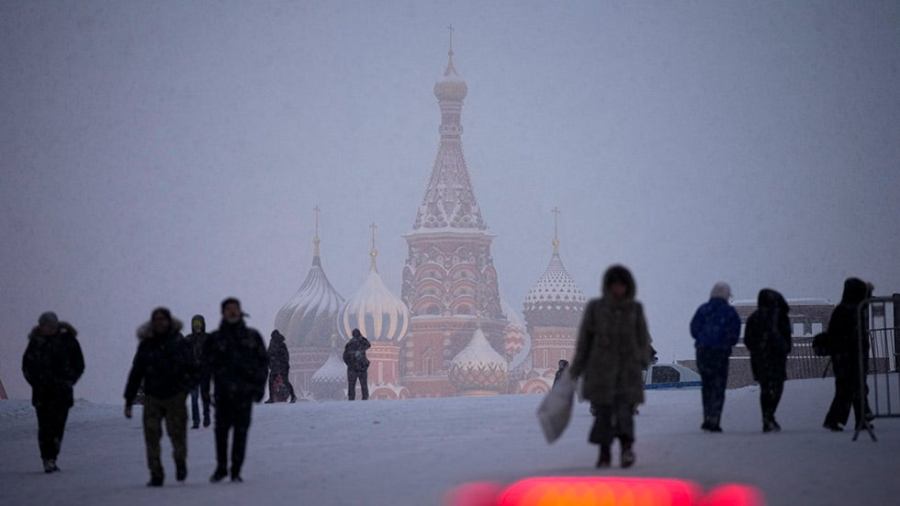
Despite sanctions imposed by G7 countries, the Russian government has largely been able to prevent a significant impact on its citizens. (Associated Press)
Kilcrease added that the Russian government has managed to limit the economic shocks to its population through creative, technocratic solutions.
“In the early days of the sanctions regime, we saw them immediately impose capital controls and other sorts of things that kind of arrested the fall of the ruble; that was an appropriate kind of bureaucratic technocratic maneuver,” she said.
“They are a very capable bureaucratic actor,” Kilcrease added.
The government has also increased funding for social services to counter the higher costs of living and worked to replace Western services and products that exited the country in waves at the outset of the war.
“The general public sentiment is not too bad in Russia,” said Maria Snegovaya, senior fellow for Russia and Eurasia with the Europe, Russia, and Eurasia program at the Center for Strategic and International Studies (CSIS).
“People will remain very, kind of, optimistic about the future. They think this is not going to last for a while, they think it’s all recoverable. But time will tell if they’re right. I actually don’t think this is right. I think Russia is in it for a long haul,” she said, adding that there is a “slow deterioration of the life quality.”
And even as the U.S. estimates that approximately 200,000 Russian soldiers have been killed or wounded in the fighting, there seems to be little public outcry.
“For some Russians, yes, they’ve acquired a meaning to their suffering, or a meaning to their patriotism, we can’t discount that,” said Vassilieva, of the Middlebury Institute of International Studies.
Putin’s base of support appears rooted in a generation that came of age with the fall of the Soviet Union in 1991 but were left out of the benefits of a society that promoted capitalist gains.
“The majority of the Russian population, those who are over 50, are still very traumatized by the ‘90s,” Vassilieva said.
“Those people who failed to become successful ‘capitalists’, or successful citizens of the market economy, who suffered financially, who lost the sense of dignity, that sense of mission that they had during the Soviet time when they were growing up, they accept it [the propaganda] and they believe it. So their suffering acquires some meaning.”
But nearly 1 million Russians have fled the country, according to U.S. officials and media reports, driven by opposition to the war, strain under economic pressure or fleeing conscription.
An exodus of young, largely educated professionals has caused a “brain drain,” one that Vassilieva reflects on with sadness — describing Moscow, St. Petersburg and other major cities as formerly lively, cosmopolitan centers of business and culture that are being suffocated.
“The country was starting to spread its wings,” she said.
Where is the opposition?
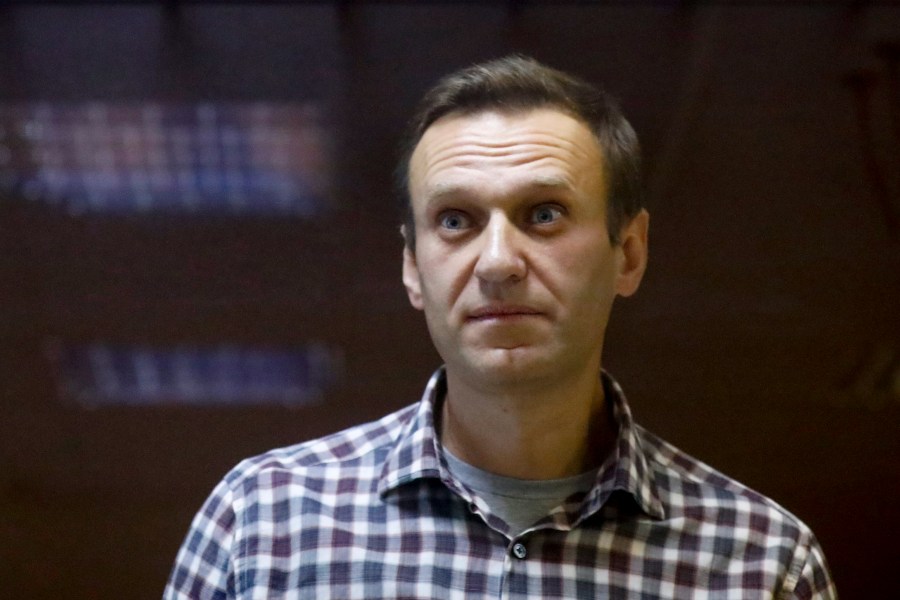
Russian opposition leader Alexei Navalny stands in a cage in the Babuskinsky District Court in Moscow, Russia on Feb. 20, 2021. (AP Photo/Alexander Zemlianichenko, File)
Among the Russians in exile under Putin are supporters of jailed Russian political opposition leader Alexei Navalny. Long a thorn in Putin’s side, Navalny remains outspoken on social media, where his political platforms are posted by supporters transcribing his handwritten notes sent from jail.
Navalny and his supporters are the most prominent faces of a disjointed and disunited opposition in exile.
Leonid Volkov, Navalny’s chief of staff, met with U.S. Deputy Secretary of State Wendy Sherman in early February.
Stephen Nix, the regional director for Eurasia with the International Republican Institute, who works closely with Navalny’s exiled network, described the opposition actors as motivated and hopeful that they can exploit — however slowly — doubt and mistrust among the Russian population toward Putin’s failures in Ukraine.
“There is no one in a position to change things right away,” Nix said, “but the longer this goes on, with no Russian victories, this drags on, that this doubt will increase to the point where there’ll either be a public reaction or there’ll be an internal reaction.”
But Snegovaya, of CSIS, is critical of that notion.
“There’s no protest against the war even outside the country and that’s all you need to know, on the Russian side, that’s all you need to know about this,” she said.
Still, public pressure has shown some influence on Putin, who has so far held back on announcing a public, second mobilization and that follows fierce backlash and chaos surrounding a September drive for 300,000 recruits — and that prompted one of the major waves of exodus from the country.
Putin remains ‘all in’ on the war
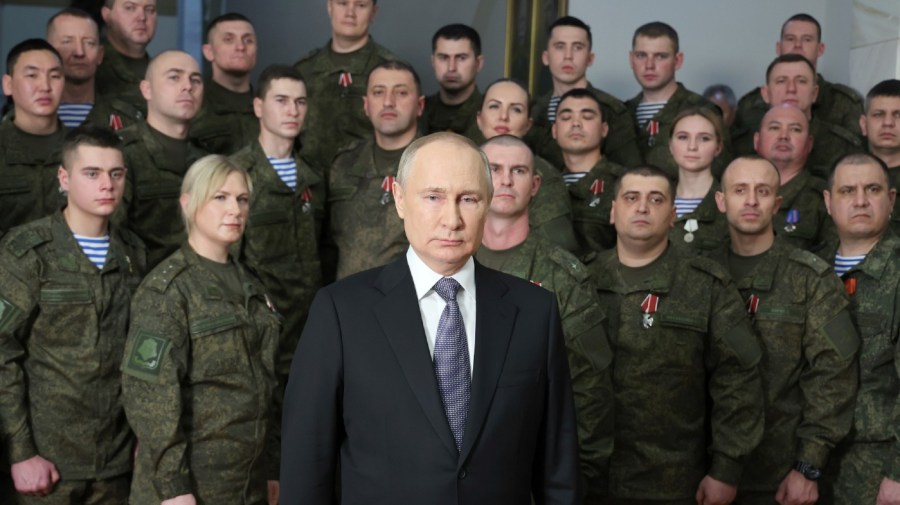
President Vladimir Putin speaks in a recording of his annual televised New Year’s message after an awarding ceremony during his visit to the headquarters of the Southern Military District. (Mikhail Klimentyev, Sputnik, Kremlin Pool Photo via AP)
Nix said that focusing on exploiting doubt and uncertainty within the Russian population is an imperative over the next year, ahead of the 2024 Russian presidential elections where Putin will have three choices — to run, step aside or cancel the contest.
“None of those three options are attractive to Vladimir Putin,” Nix said, adding that Putin is unlikely to step down and that he expects massive voter fraud would be needed to assure his victory.
Canceling the elections would be an admission that the “special military operation” — as it’s officially referred to in Russia — is going badly.
Still, European officials say that Putin has shown no signs of abandoning his original ambitions of overtaking Kyiv, even in the face of all his failures — Ukraine’s successful defense of the capital in the initial days of the invasion; embarrassing Russian military defeats and troops fleeing their positions; the deaths of top generals; and attacks against symbols of Russian might, such as the sinking of its naval flagship the Moskva and an explosion against the Kerch bridge linking Russia to Crimea.
Putin is “all in on Ukraine getting back into the so-called Russian empire,” a senior European official told reporters in a briefing on Feb. 20. “There may be nothing short of that goal that he’ll ever settle for. Which doesn’t mean he wouldn’t accept an interim peace deal, just that in two, three, four years time, it wouldn’t be a peace deal because he’d try again.”
Another senior European official, in a briefing with reporters on Feb. 17, said “Putin’s war aim continues to be the same, the center of gravity is Kyiv.”
The path to peace looks long
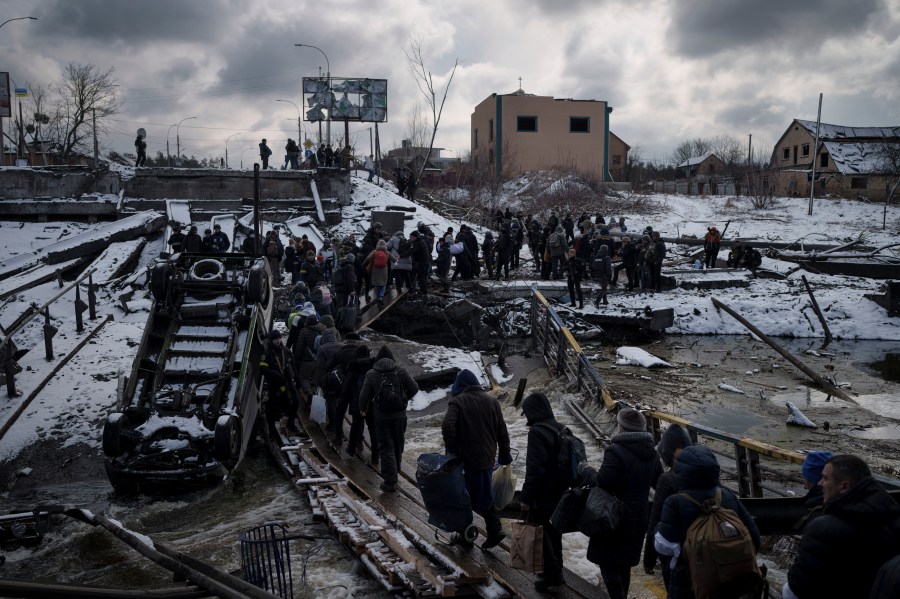
Ukrainians cross an improvised path under a destroyed bridge while fleeing Irpin, in the outskirts of Kyiv, Ukraine. (AP Photo/Felipe Dana, File)
Given Putin’s refusal to back off his maximalist ambitions, U.S. and European officials are doubtful of an opening, in the short term, for negotiations.
“President Putin has too much to lose on one hand to go for negotiations, at this point he feels he can get further gains,” the European official told reporters on Feb 17.
And Ukrainians, holding the front line under a battering from Russia targeting energy and civilian infrastructure, are resolute in their ability to further push Russian forces out.
“I think we should all be focused on one thing: Even if we are deadly tired, we cannot allow ourselves to get tired of fighting for freedom,” Ukrainian Foreign Minister Dmytro Kuleba told the Munich Security Conference this month.
Kyiv has talked about pushing Russia out of all its territory, including the parts seized in 2014 and in particular the Crimean peninsula, a major military base and staging ground for Moscow.
While U.S. officials have reportedly expressed doubt over Ukraine’s ability to retake Crimea, they are public about the need for the peninsula to be a main focus of any settlement.
“Ukraine is not going to be safe unless Crimea is at a minimum, at a minimum, demilitarized. And that is part of ensuring that there is a sustainable deterrent,” Victoria Nuland, under secretary of State for political affairs, told the Carnegie Endowment for International Peace on Feb. 16.
Comfort Ero, CEO of the International Crisis Group, said in a briefing with reporters that ICG is advocating for Ukraine’s military and diplomatic backers to “dangle some incentives in front of Russia, should it show a willingness to stop the war and to pull back from Ukraine.”
“These are unpalatable options right now, both for Ukraine and Russia,” she said, but added the goal is to avoid pushing Putin into a corner, “and what he does as a result of that is not clear. And then he may then push for an ugly settlement and that would, I think for the Ukrainians, be a serious concern.”
Copyright 2023 Nexstar Media Inc. All rights reserved. This material may not be published, broadcast, rewritten, or redistributed.

